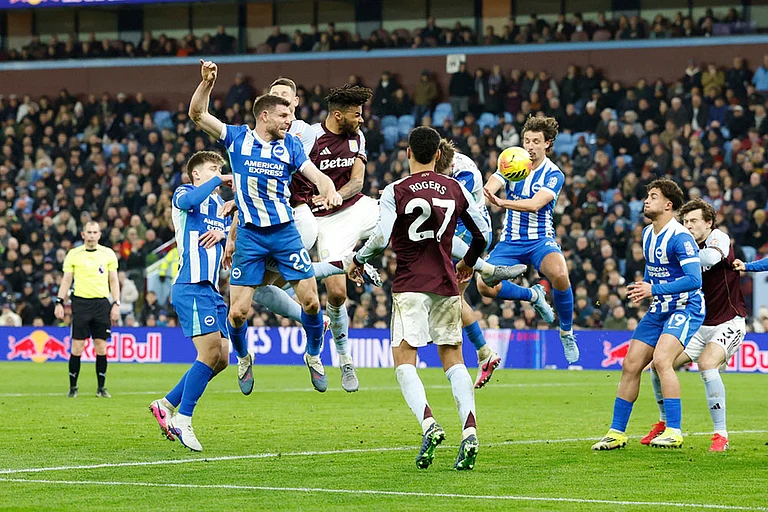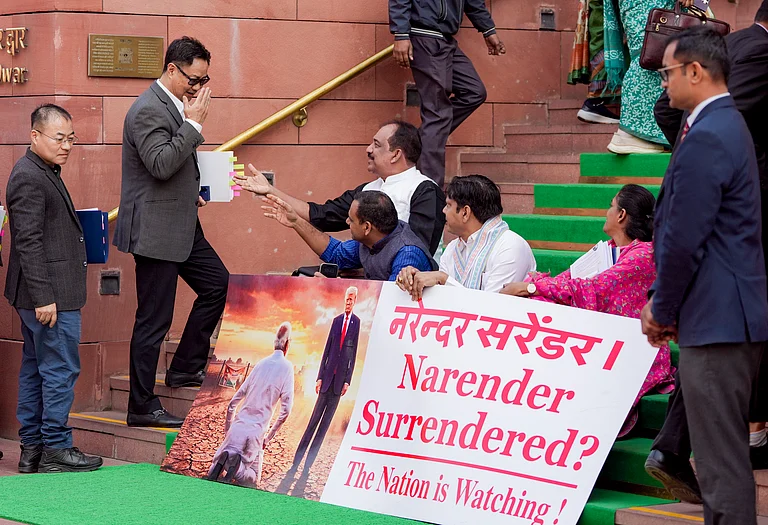Karan Vyas has slowly and steadily become a big name when it came to writing dialogues in some of the most hit web series in India. He has written the dialogues for web series like ‘Saas Bahu Aur Flamingo’ and ‘Scoop’ recently. Previously he had written dialogues for ‘Scam 1992’.
Talking to Prateek Sur, Karan Vyas opens up about what makes the dialogues so important for web series. Also, he talks about his journey, his association with big filmmakers, how he has managed to stay grounded all this while, and lots more. Excerpts:
What inspired you to become a writer? How did your journey as a Dialogue Writer start? According to you, what are the key skills needed to be a successful dialogue writer?
So basically, after finishing my film school internship, I was then producing, I was assistant to one of the producers in Los Angeles. And my basic job was to read lots and lots of scripts. For nearly four or five months, I was reading almost a script every day. And that's when my love for writing scripts began. And what happened with this: So I started my journey as your dialogue writer with ‘Scam’ and had already done a couple of Gujarati films, I was already writing one Hindi film man until I was looking at the same point of time or dialogue writer for Scam 1992 and understand the Gujarati culture with a value language. That's sort of the kind of writer he was looking for, and a couple of people recommended my name, I met, our vibe matched. I wrote a couple of initial episodes, of course dialogues. And that's how my journey as a writer began. I think there are a couple of skills which are required to become a dialogue writer. Of course, you need to have a certain kind of command over the language Hindi because I'm a Hindi dialogue writer. And that's the number one thing you need. Number two, what you need is the understanding of you know, how to bifurcate each and every character dialogue wise, they should not sound identical. So, that one key aspect is very, very important. And the third aspect is you need to have a very strong observational power, you need to see a lot of characters around you, you need to meet a lot of people and observe them even in a social circuit to just try to pick up certain types of characters around you, how they talk, how they communicate. You know, in India, everybody i Seems like subconsciously our dialogue writers, you know, so even when you talk to any rickshaw walla as well you know, sometimes they're going, you know, give you one or two lines here and there. But that's, that's, that's another thing. You know, you have to be very very observant of people. So yeah, these are the main skills.
How did you become a part of the ‘Scam 1992’ and ‘Saas Bahu Aur Flamingo’ team?
As I mentioned earlier, I was called by Hansal sir. I did not know what the exact project was. But I knew that for a web series. He needed a dialogue writer who has his Gujarati background. And, you know, I met him. We talked a lot. We did not talk about the project. We talked about everything. It was mostly like a vibe check kind of a meeting. And then I was given the first three episodes of Scam 1992 And I was asked to attempt to write dialogues for those episodes and that's how I got Scam 1992. Saas Bahu Aur Flamingo came in as there was a long story, but I was already writing one feature film for Maddock Films at that point of time. And internally in Maddock, somebody recommended my name to Homi Adajania . He met me and we actually started developing a Bible. Then due to some personal commitments, I couldn't continue with the screenplay. And by the time Sourav and his team Nandini and Arman took over the screenplay and then once they were done with the screenplay, by the time I was available, and then I did the dialogues for Saas Bahu Aur Flamingo.
‘Scam’s success must have opened several doors for you? How did you manage that and what factors you keep in mind while choosing a project?
Of course, Scam success opened many, many doors. I was called to many production houses and I met a lot of producers and was offered lots and lots of interesting projects. But I just went with the gut. In other subjects, I wanted to actually challenge myself and try to pick up subjects which are very different from each other, different worlds, different sets of characters. And I wanted to diversify myself, you know, in terms of projects and that's what I did. Actually, if you see Saas Bahu Aur Flamingo or Scoop, which has recently come in, or Scam there, all three are very, very distinctively different sorts of projects. It has a different set of tone, it requires a different set of dialogue, writing and everything. So yeah, I tried to be a little diverse when I when I picked up the project, and that's what I was trying to do.
Can you tell us about your experience of working on Netflix’s web series ‘Scoop’?
Scoop was fantastic. First of all, that's the first thing I signed after the Scam. It was with Hansal sir. So it was no brainer, I immediately said yes, within a couple of months, I received a Bible, which was written by a friend mine, the co-creator on the show, and it was one of the most fantastic Bible I ever read, it was very, very detailed out and very well structured. And when I joined the writers room and it was one of the shows that as a dialogue writer, I was part of the process from the beginning when they were writing screenplays. The writer room was very hectic, but very, very enriching and I had a fantastic time. It was quite challenging for me doing, you know, this kind of show after scam, where you know, Scam gave me a lot of room to do a lot of, you know, sort of dialogue, Buzzy and one liners here and there. And the scope required a certain sort of gravitas and brevity, when it comes to the dialogues, and that's what I delivered. Just happened actually, you know, I tried and it's all the credit goes to all on trusting me, and trusting on my abilities that I will be able to deliver what they were looking for in the show. Every web series comes with different sorts of challenges.
How do you approach writing dialogues for a web series?
With each web series, I sort of go with a different sort of approach. If it is a show like Scam, my approach is to understand sort of a world of you know, fair market how they you know, I because it's based on true stories, so I try to read about them a lot I try to understand characters a lot. So once I sought out those primary characters, okay, this is this is what they are, you know how the three dimensionally they're going to sound like this are their thought process, who they going to follow, who would they consider idol for themselves, all those things I go through and then when it comes the most challenging part is the secondary characters. Because shows like Scam have a, I don't know some 100 Plus, speaking secondary character, when your task is to make each one of them sound different, they all should have their own distinct voice even though somebody might just come from a scene or two, but it should leave an impact in a certain way. So lots and lots of brainstorming and self doubt and writing- rewriting goes into and, and I deliver. Same thing will happen with Saas Bahu Aur Flamingo where you know, there are seven to eight primary characters and it's very important that all should not sound similar but they need to have their own voices. Similarly both the bahus should sound very different from each other, which basically justifies their character. Shanta is a different character. So, it comes with a different sort of challenge with each web series. Once I am onto project then I try to navigate and discover that okay, this is the approach I'm going to pick up for this particular series and I try to, you know, navigate through all those challenges and deliver.
How do you ensure that your dialogues are authentic and relatable to the characters and plot?
I try to be very, very honest to the characters. So when I write dialogues, they don't just just serve the story. They should be very, very authentic to that, that person. So I keep on asking questions that okay, if this character is going to say a certain way or this kind of a line? If yes, why? And if not, why not? For example, you know, there was one scene where Sucheta abuses, there's only one scene where he just once abuses Harshad Mehta, and you know, everybody was like anyone. I myself was really doubtful why I had kept that dialogue or something like that. And then I, my reasoning towards that was that why not? In that particular scene, Harshad Mehta has, you know, tried to buy out Sucheta to stop reporting on him. And this is the time where Sucheta has literally lost it. How dare you try to buy me out. And that's the time she basically uses a curse word, like, just one one curse word. And that's the right moment. You know, that's it. And if anybody or somebody likes to chat with a lot of integrity would be, you know, put into that situation, the first reaction would be something like that. And so I try to be so true to the character and the situation that comes up, if this character is going to behave in a certain way, in a certain situation, if yes, then I go for it. So I try to be very, very authentic to the characters and their psyche. And by doing that, I am actually doing a lot of justice to the character and the plot.
Which director have you enjoyed working with the most and why?
I will give you a very political answer, I enjoyed working with each and every director, because each and every director, you know, brings in a different sort of perspective, towards the cinema, and the filmmaking and school of thought. And I learned from everyone. So I have even picked up a project. Now, you know, with all the sort of directors who have looked up to all these years. And to pick one, it's very difficult, but I can easily say that Hansal sir is like, you know, now family to me, and it's very, very easy working with him, He guides me a lot, and he helps me a lot. And because of his constant guidance, I am achieving what I am achieving, on each and every project.
Can you share some insight into the challenges that you're faced while working on a dialogues of ‘Scoop’?
Writing dialogue for Scoop was extremely challenging. That word was a very, very technical word. It required a certain type of a responsibility to give lines to each and every sort of character. Plus, again, it's based on a very emotional and sensitive true story. So I also have to be, I have also had to do justice to those characters and their emotion and, you know, give those lines to them, which justifies their emotions at that point of time. The reasoning at that point of time, you know, scopes dialogue, writing was more sort of, you know, derived from a lot of characters' internal conflict. So that was challenging. Plus, it was very different from what I had done previously in Scam. And I haven't done this kind of a sensitive project. So yes, it was very, very challenging.
In your opinion, what distinguishes a well-written dialogue from a mediocre one?
So it's also very, very subjective, of what is a well written dialogue and what is mediocre? Reverse cinema overall is a very subjective medium, I think, a dialogue which serves a character and its psyche, and if it justifies its emotion in that particular moment, is the dialogue well written rather than just having a one liner just for sake of it? So I think that should answer your question. But overall, it's a very, very subjective thing.
What are your future projects that we can look forward to and what can I expect from you in the coming years?
I'm doing a lot of exciting projects. I cannot talk about many of them. Currently, I'm very, very busy with a web series on MK Gandhi, which is again, it's been directed and shown by Hansal Mehta, and it's with Applause as the producer of both the Scams I have worked on. So it's almost the same team we are working on. So I'm really really excited about it.



























